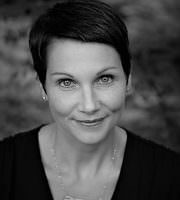by Maggie Smith
Because a lie is not a lie if the teller
believes it, the way beautiful things
reassure us of the world’s wholeness,
of our wholeness, is not quite a lie.
Beautiful things believe their own
narrative, the narrative that makes them
beautiful. I almost believed it
until the new mother strapped
her infant to her chest, opened
the eighth-floor window,
and jumped. My daughter tells me,
after her preschool field trip
to the Firefighter Museum,
about the elephant mask, its hose
like a trunk, and the video of a man
on fire being smothered in blankets.
She asks me if she knows anyone
who got dead in a fire, anyone who
got fired. When will I die? she asks.
When I was a child, I churched
my hands, I steepled my hands,
and all the people were inside,
each finger a man, a woman,
a child. When I die, will you
still love me? she asks. The mother
cracked on the pavement—
how did the baby live? Look,
he smiles and totters around
the apartment eight stories up.
Beautiful things reassure us
of the world’s wholeness:
each child sliding down the pole
into the fire captain’s arms.
But what’s whole doesn’t sell
itself as such: buy this whole apple,
this whole car. Live this whole life.
A lie is not a lie if the teller
believes it? Next time the man
in the video will not ignite.
The baby will open like a parachute.
Last updated October 30, 2022




